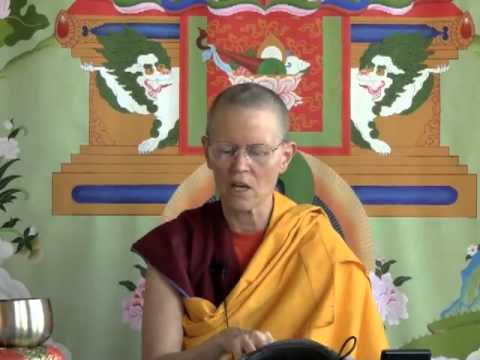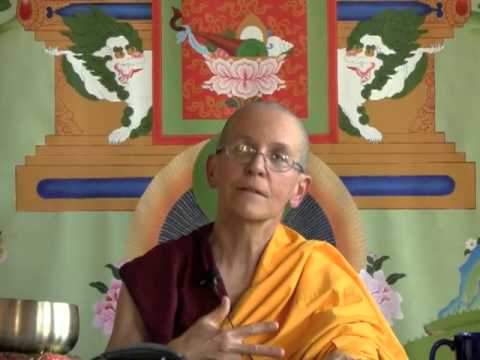Self-centered Attitude
In this talk for the Bodhisattva's Breakfast Corner, Venerable Thubten Chodron clarifies the meaning of "self-centered thought."
There is a point that came up during retreat that I wanted to clarify about the disadvantages of the self-centered thought. I didn’t mean to imply or infer or say that every single thing we think is self-centered. We can look at our own mind and see that we have kind thoughts and good motivations.
For example, when I was talking about jumping to conclusions, I said, “We never consider that maybe the other person wasn’t meaning what they said.” When I use words like “never” in that context I mean that in our ordinary kind of way. It doesn’t mean human beings NEVER do that. I want to be really clear here because it’s clear when we look at our mind that we have kind motivations. We have generosity; we have good thoughts towards people. We can trust that those things aren’t self-centeredness.
When we talk about the disadvantages of self-centeredness, that’s referring to that mind that’s saying, “ME! I’m most important! Take me first! Give me what I want! Get rid of all my problems! I’m the most important one in the world!” That’s the self-centered thought. Clearly not all of our thoughts are self-centered.
If I really and truly thought that human beings never ever at all think about others, then what in the world am I doing teaching the Dharma? If I don’t think people have these possibilities to think and act differently then I certainly wouldn’t be spending my time talking about it.
This is a good example of why it’s really important to think about the teachings and ask questions when you don’t understand so that you can discuss with other people. Because when you check with your own mind, you can see what your own experience is. Then, for example, if you think the Buddha is telling you that you are always selfish but you know that you aren’t, you might think, “Well, maybe I’m not understanding the teaching as it’s meant to be understood.” That’s why it’s good to ask questions and to get clarification.
On the other hand, there are times when we are very self-centered, like when we try to put together the perfect bite of food. I would say we’re usually involved with ourselves when we’re doing that. We’re completely into this plate of food at that time. Wouldn’t you agree? The rest of the world is on hold, and we’re putting our carrot and lettuce with the right amount of salad dressing so that we can get the maximum pleasure out of each bite. In those kinds of situations, we can watch and see how our mind is trying to get the most pleasure from everything. But that doesn’t mean that every single instance of our mind when we’re alive is doing that.
Questions & Answers
Audience: [Inaudible]
Venerable Thubten Chodron (VTC): Our default mode is thinking of ourselves, isn’t it? So, we need to stretch ourselves to get out of that default mode. But when we’re talking about the disadvantages of self-centeredness, it’s important not to think, “I’m bad because I’m self-centered.” That’s not the point. The point is not to feel bad about ourselves. It’s to recognize that the self-centered thought is what makes us miserable, and since we respect ourselves and want to be happy, and we want the people around us and all sentient beings to be happy, then we want to free ourselves from the self-centered thought. It doesn’t serve any purpose. It doesn’t fulfill the real things we want out of life. That’s the purpose of talking like this. Of course, the default mode is to be self-centered. We’re going to be self-centered. We don’t need to beat ourselves over the head every time we are. Instead, it’s like, “Okay, there it is again.” Then we keep being attentive and heedful and watchful, and we do something about it.
What we do is we select the aspect of self-centeredness that makes the biggest mess in our lives. For example, getting our peas and carrots into one spoonful in our mouth is self-centered and seeking our own pleasure, but I wouldn’t say that’s the most crucial aspect of self-centeredness that we need to focus on obsessively. How we’re eating every day is something to be mindful and aware of, but we need to look in our lives at the biggest way that self-centeredness creates havoc, discord and conflict in our own minds and with the people around us. We need to work on that one first. Let’s not beat ourselves over the head with the ones that are not so important. We’ll get to them. We can be mindful of them, but the big ones should be our focus.
Okay? It’s a deal then. Let’s go! [laughter]
Venerable Thubten Chodron
Venerable Chodron emphasizes the practical application of Buddha’s teachings in our daily lives and is especially skilled at explaining them in ways easily understood and practiced by Westerners. She is well known for her warm, humorous, and lucid teachings. She was ordained as a Buddhist nun in 1977 by Kyabje Ling Rinpoche in Dharamsala, India, and in 1986 she received bhikshuni (full) ordination in Taiwan. Read her full bio.


